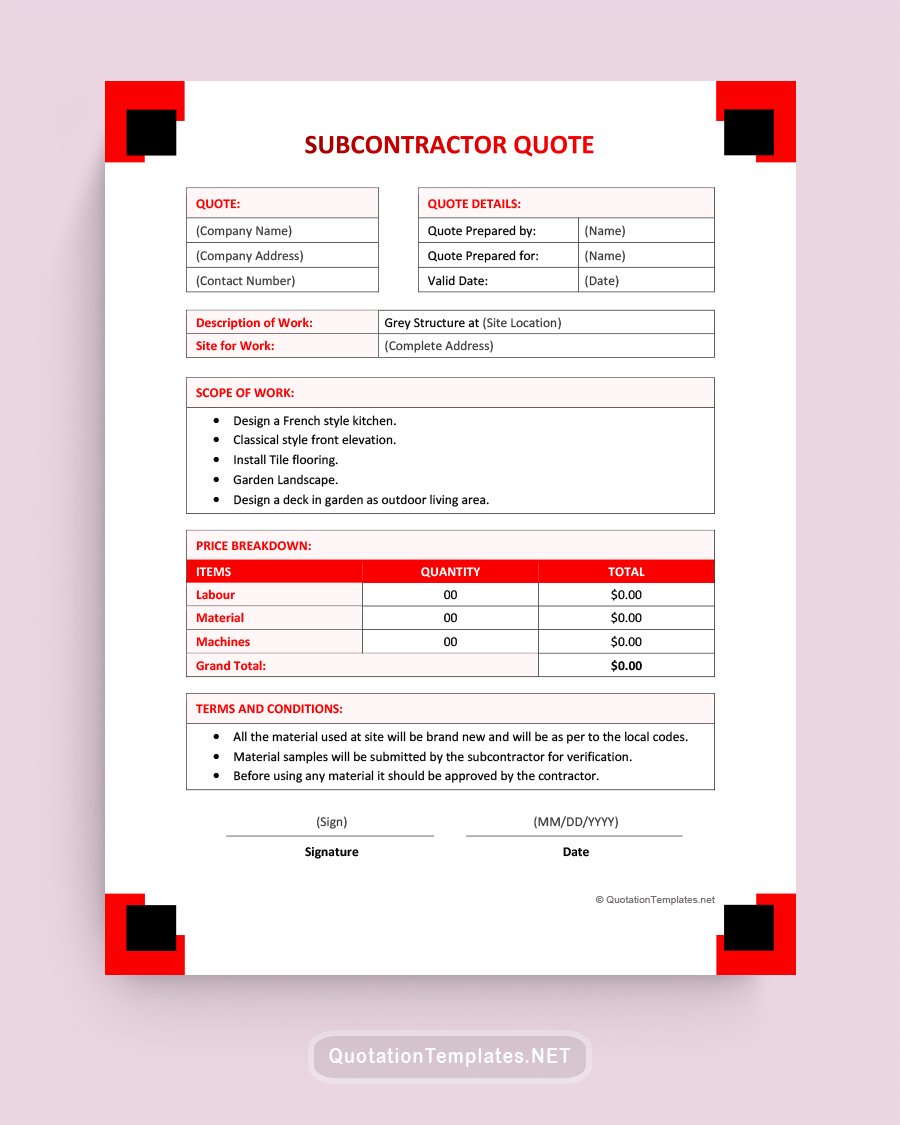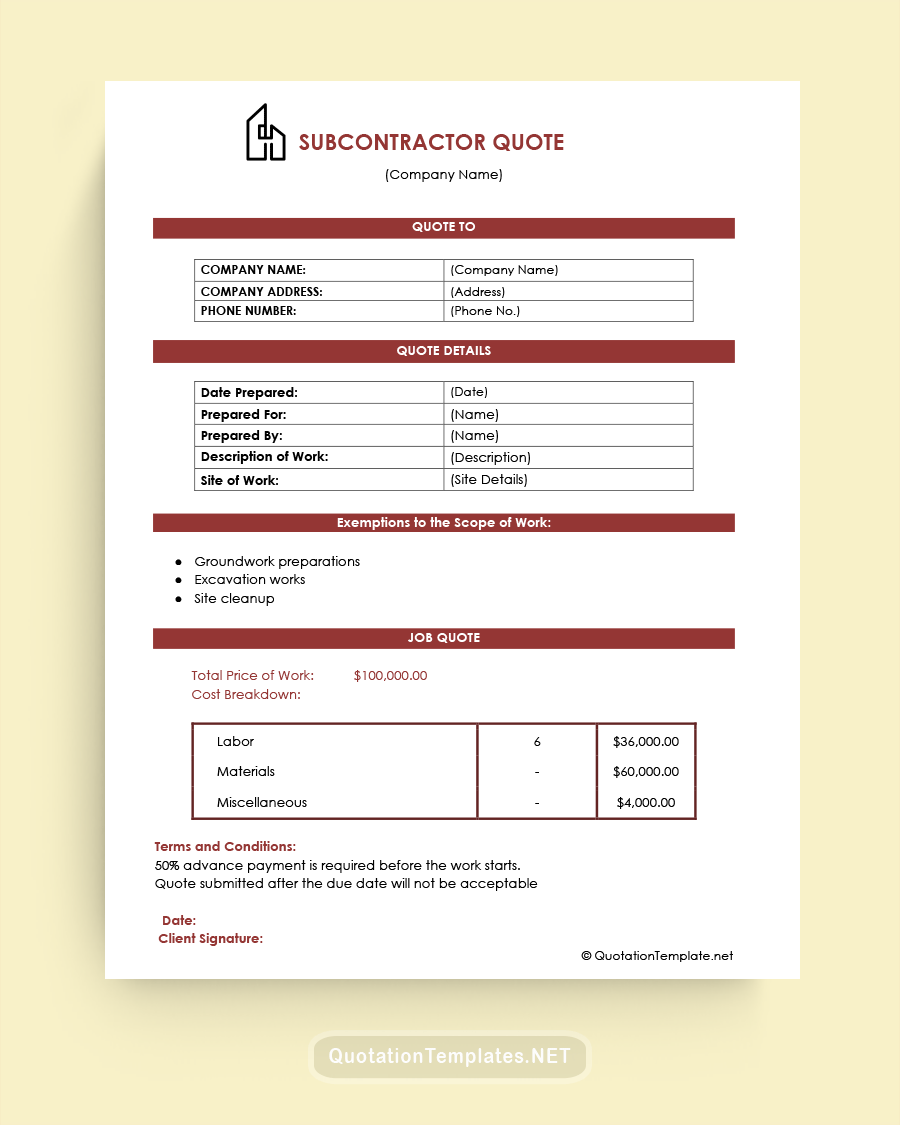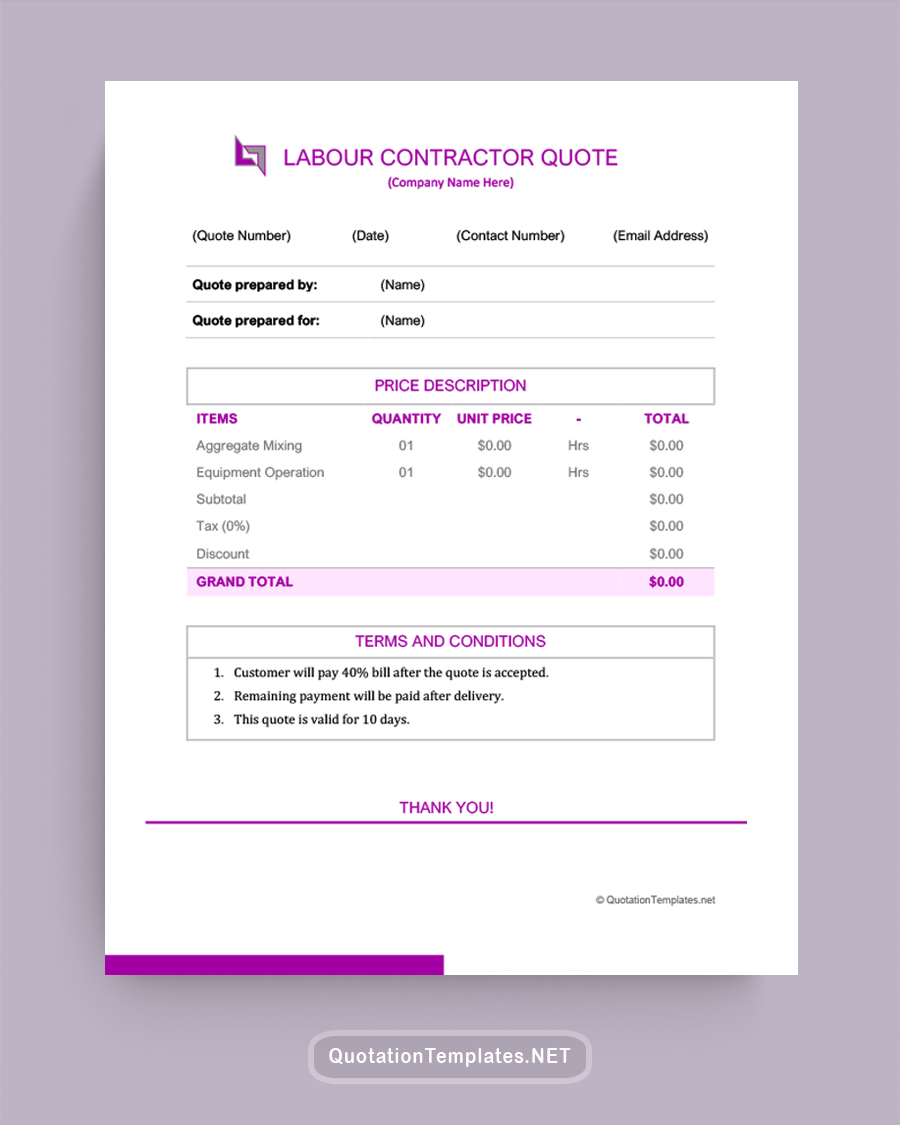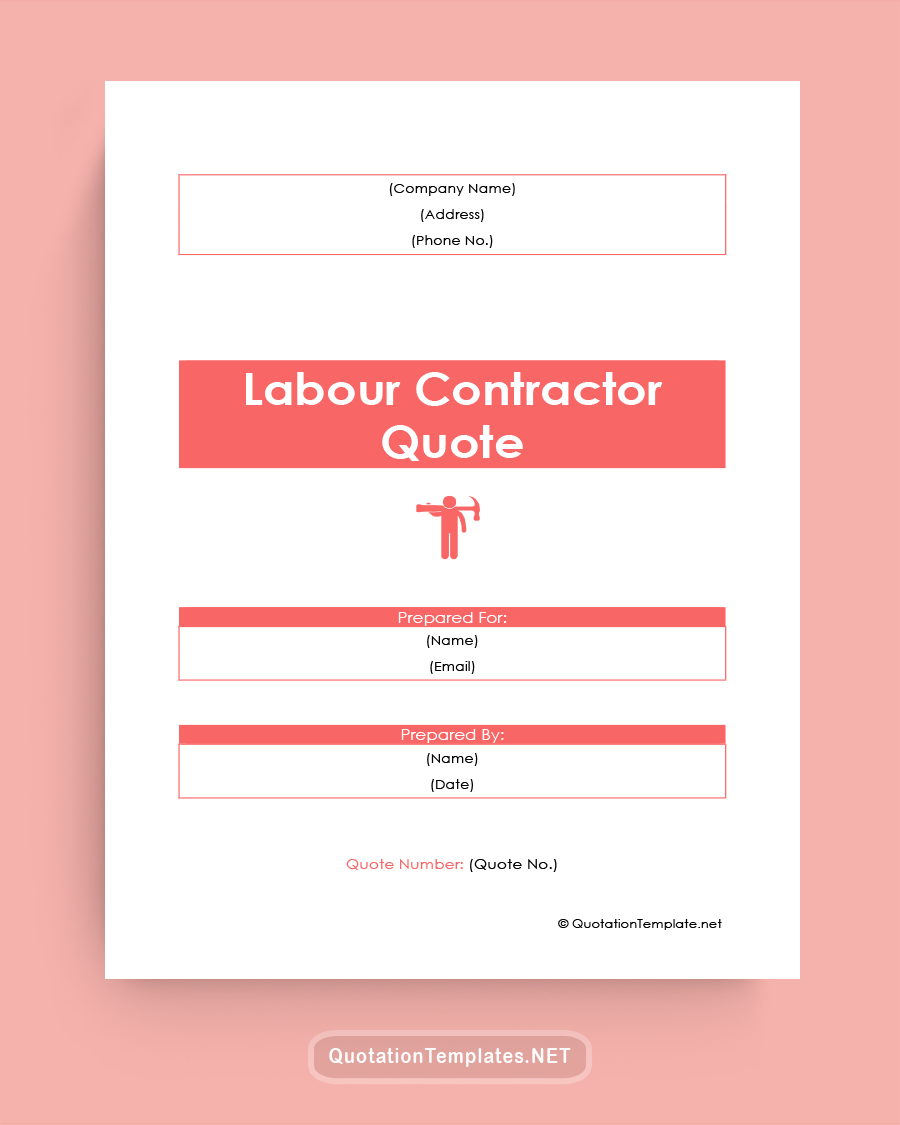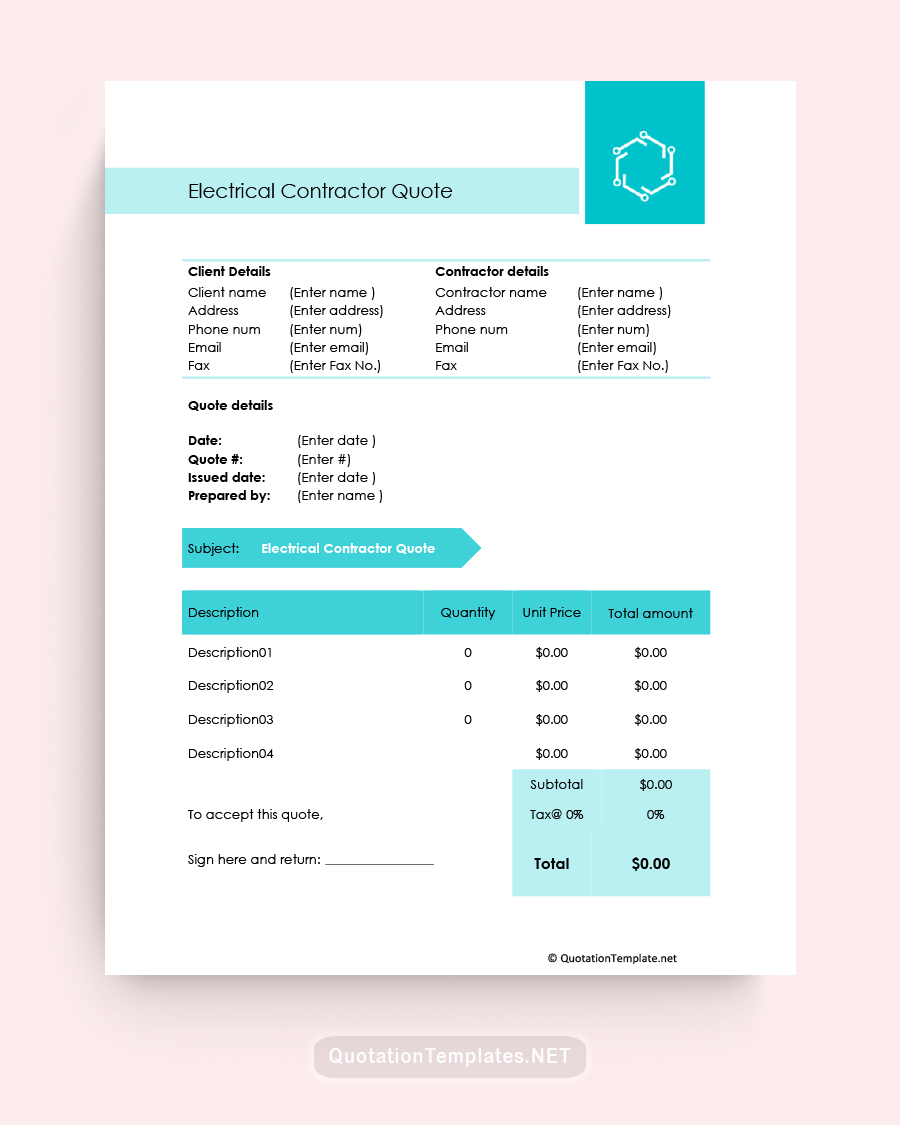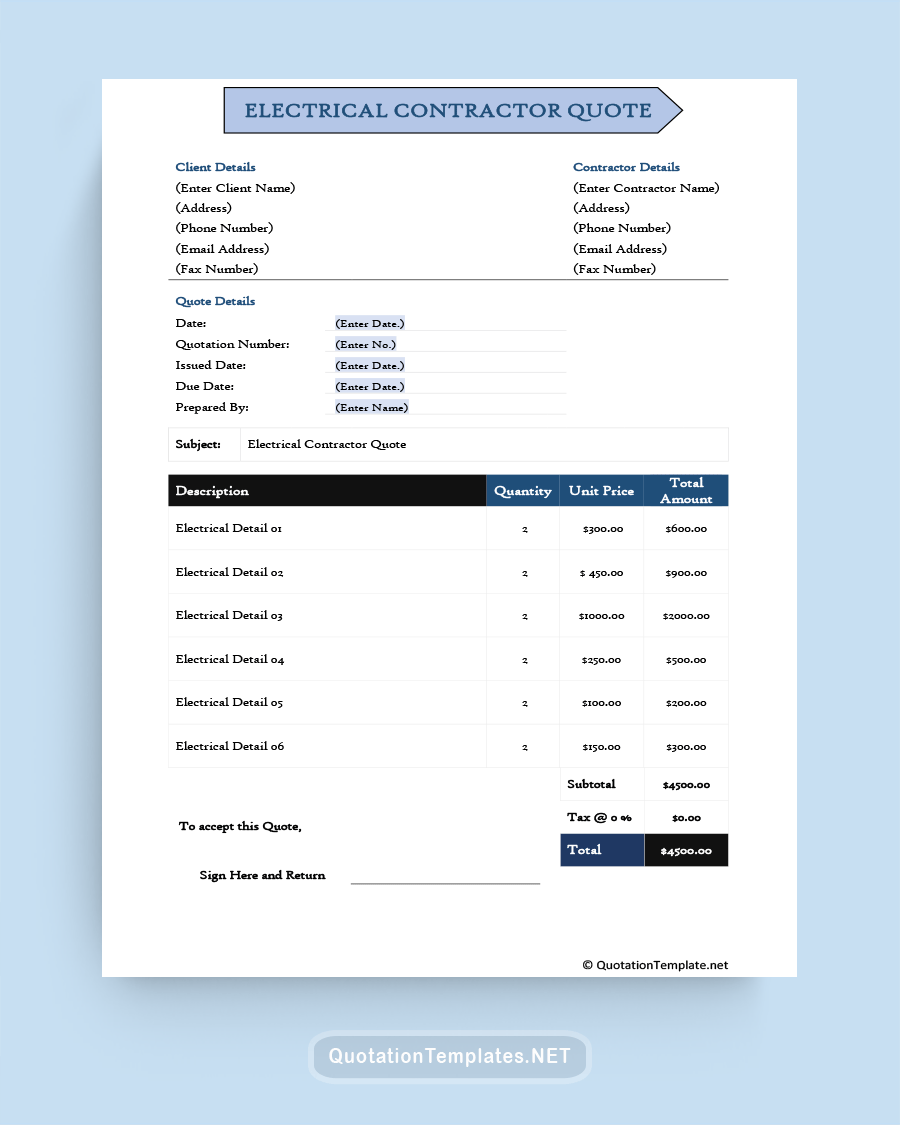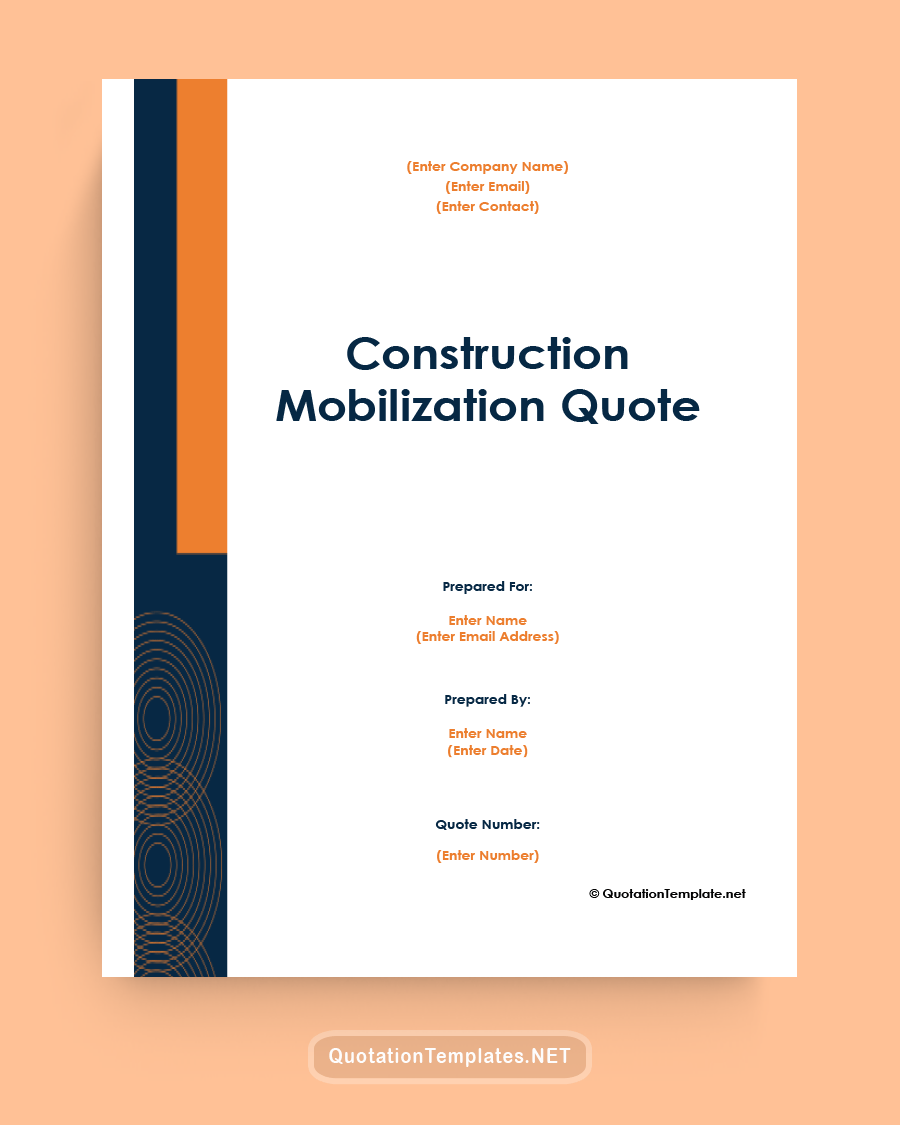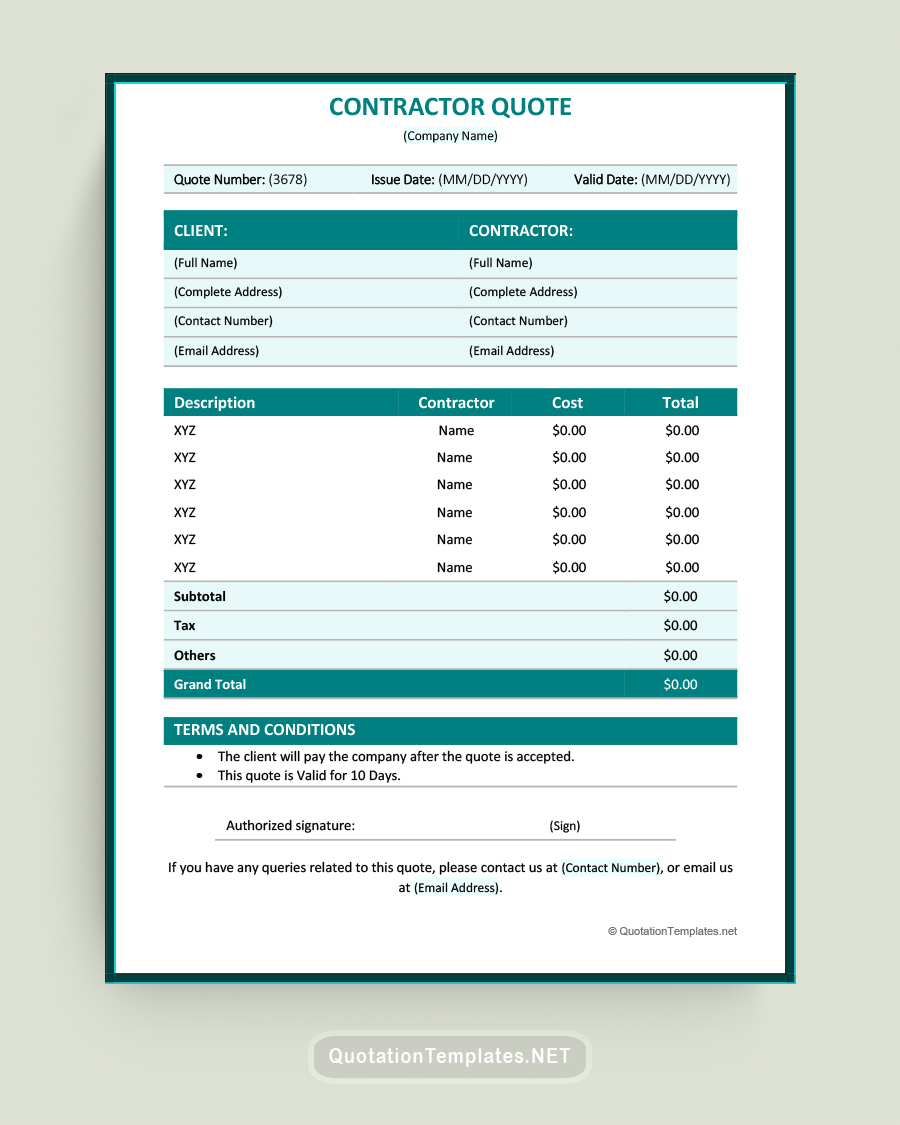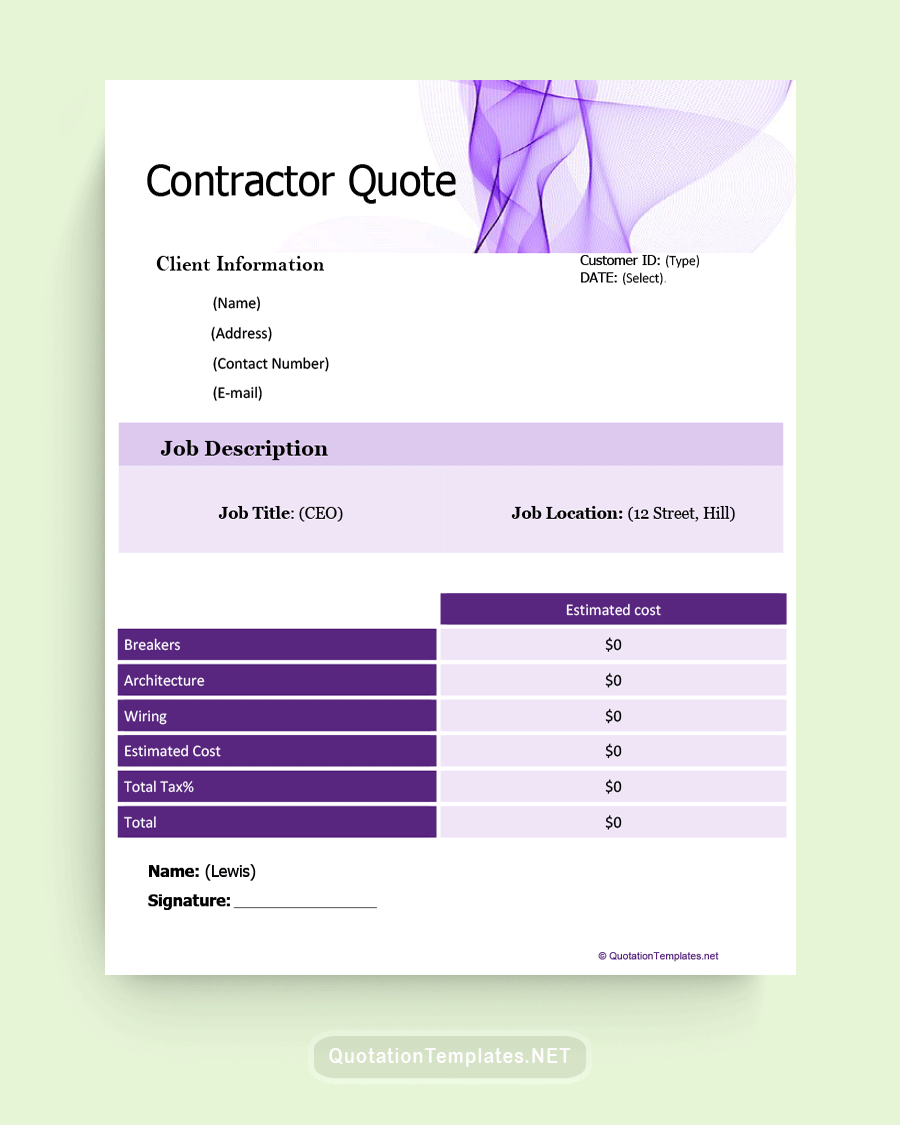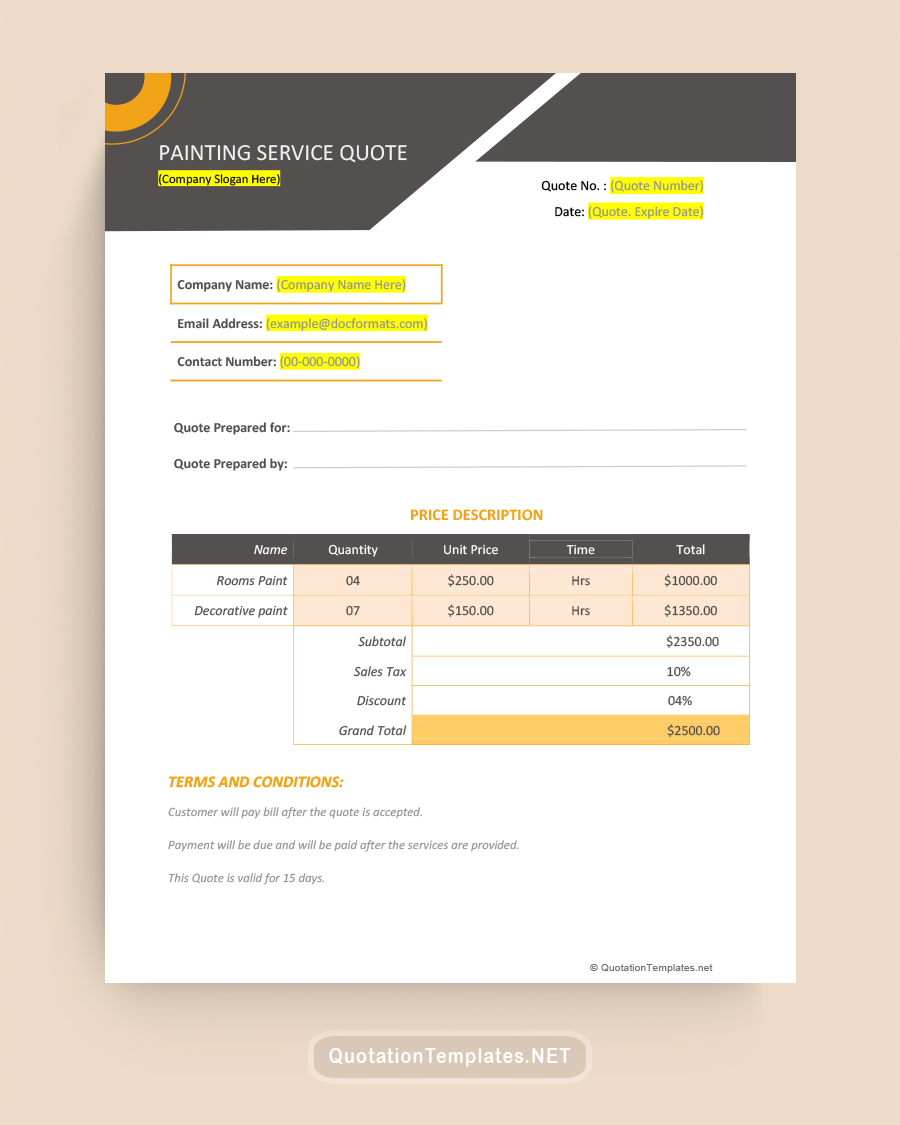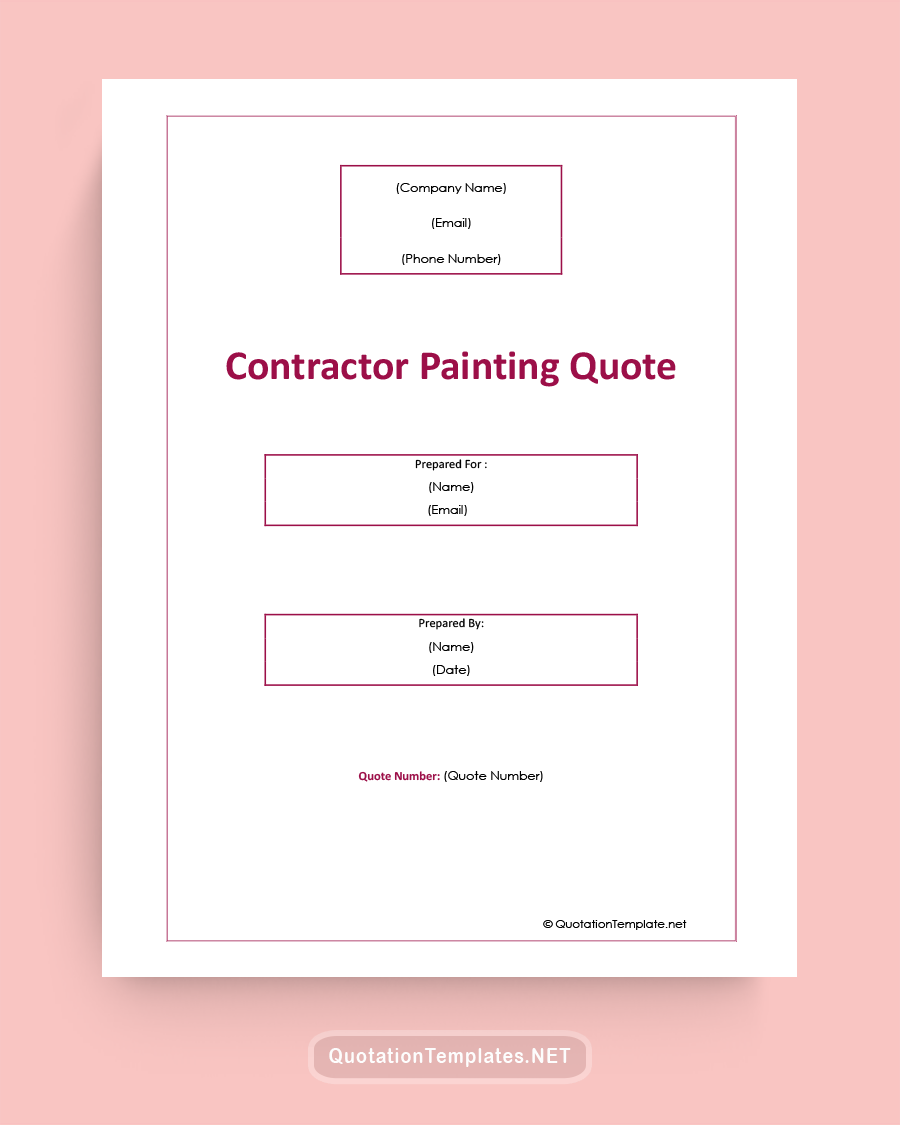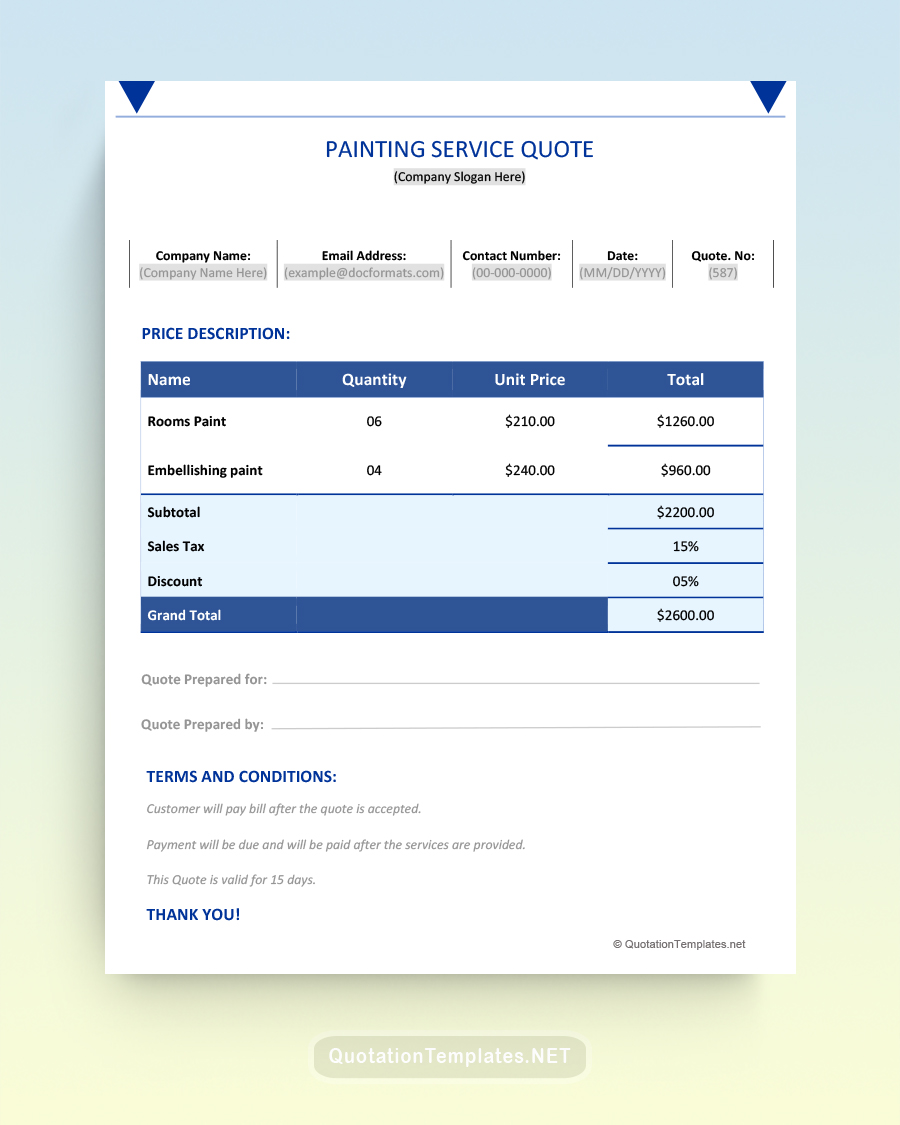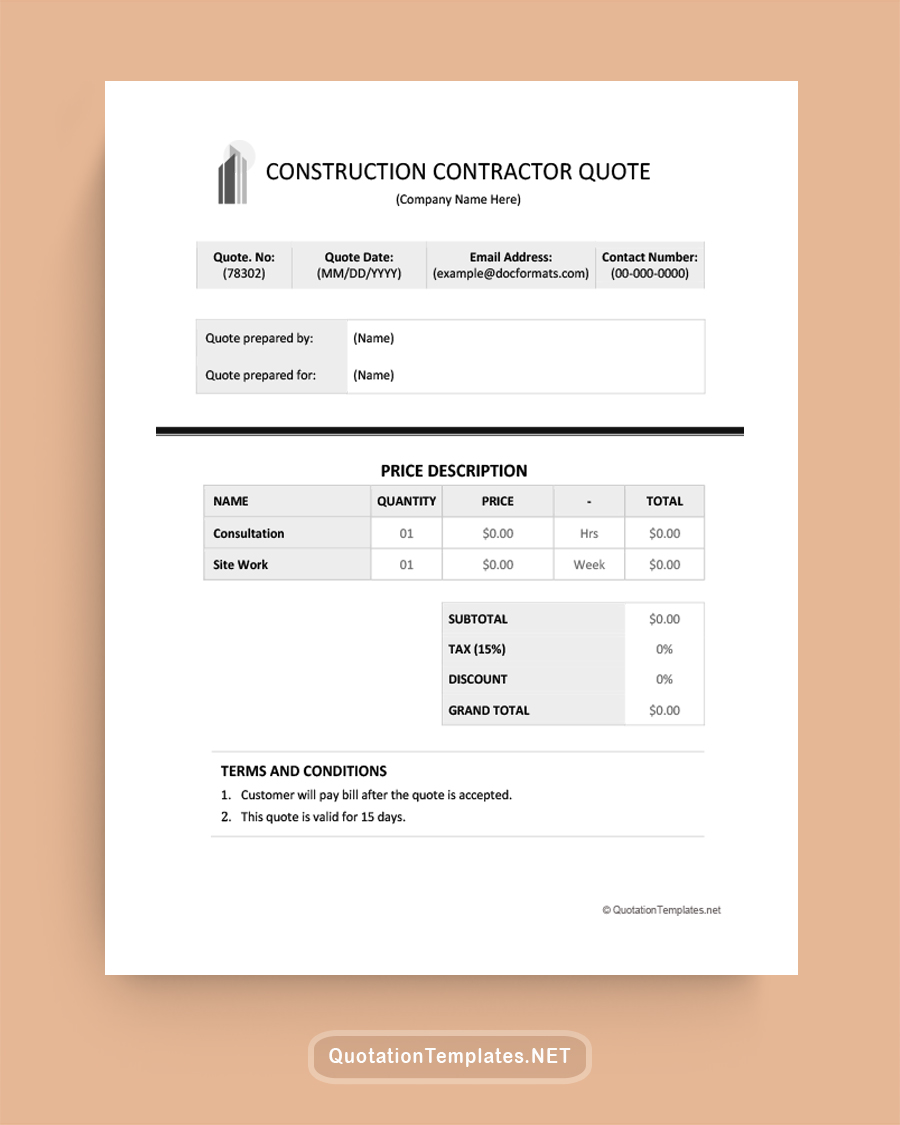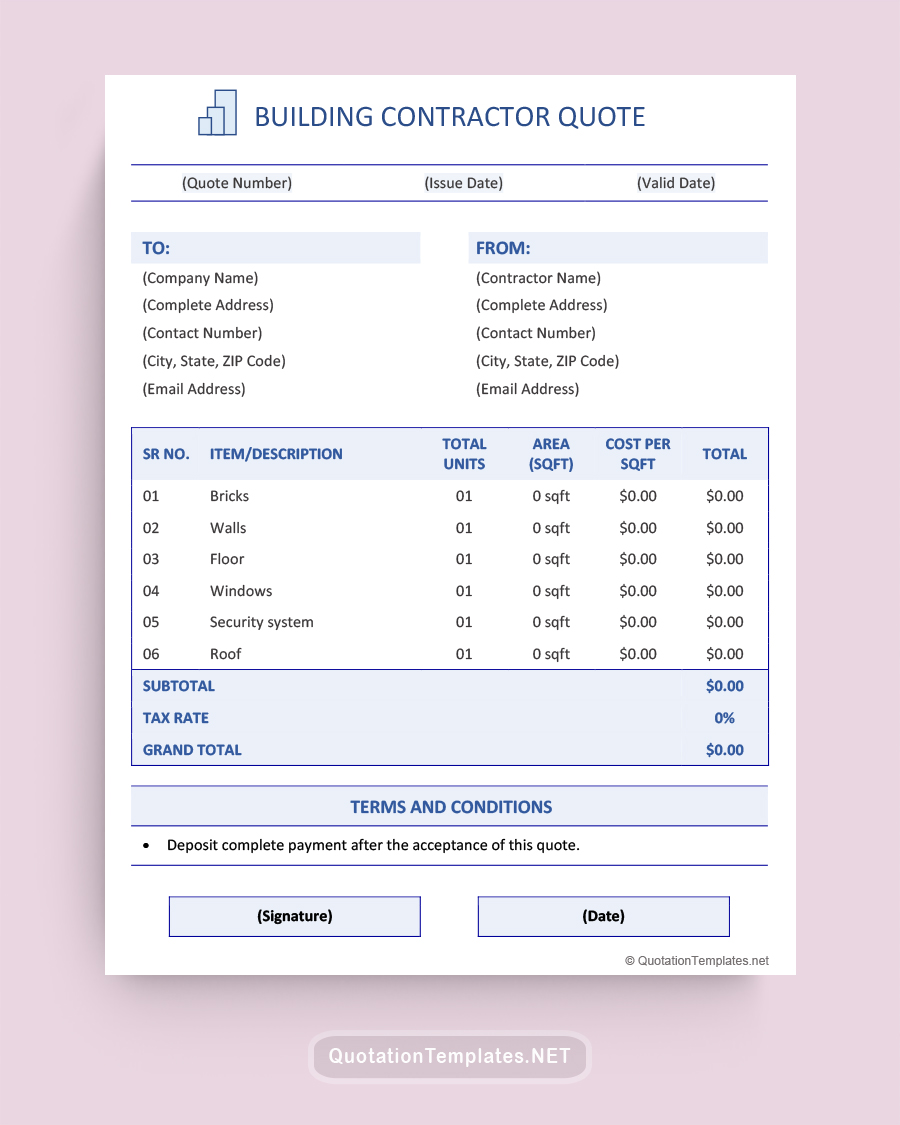Contractor Quote Templates
As a contractor, you will tackle many different types of jobs. Clients may ask you for a quick fix or upgrade, or they may need you to do an extensive building project. Whatever they want, you’ll need to provide quotes and keep proper documentation. Contractor quote templates help facilitate that process by making it quick and easy to give professional, personalized quotes detailing every aspect of the work.
The right template will save you time and help foster good business relationships. Your quotes can be used as contracts by adding an agreement for services at the end, and they will help ensure there’s no confusion about what you have agreed to do. Additionally, a well-written quote will help reduce customer frustration because the potential client always knows what to expect.
What is a Contractor Quote?
A contractor quote is a document showing the work a client has requested and gives a detailed and time-sensitive breakdown of labor and material costs. The quote is part of your standard documentation for jobs. It can become a contract in some circumstances and even help in cases of misunderstanding because it shows exactly what you agreed to do, the timeframe, and terms and conditions.
What Is a Contractor Quote Template?
A contractor quote template is a blank, structured document allowing a contractor to quickly generate a basic quote for services upon request. To use our free templates, simply download them and fill them out using Excell or Word. Doing this keeps your forms standard and easy to understand. You can reuse the blank form as often as necessary to help improve workflow and reduce the time it takes to send quotes. All you need is some basic information, and you can create a form in a few minutes for email or print.
Essential Elements of a Contractor Quote Template
A lot of information goes into a contractor quote, which can quickly become convoluted and confusing if you don’t have a good template. Fortunately, you can prevent this by using our forms and filling them out with the specific information for each job. Below are all the essential elements you need to include in your quote template in order of where they belong on the page(s). All you have to do is plug in your information and send it.
- The name and logo of the company providing the quote
- A title that clearly states that this is a construction quote
- The name and contact information for the client
- The name and contact information of the person who prepared the quote should be more extensive, including a company website and their position within the company where applicable.
- The date is essential because contractor quotes should be time sensitive.
- (Optional but recommended) A file number for easy reference
- A brief statement saying which company created this quote, for whom and why
- A job description for any work the client wants to be done. Unlike other templates which use this as a general idea, contractors should include as much detail as possible. The better the information in this section, the more clearly your job will be spelled out to prevent confusion later.
- A cost analysis chart. This should include a column for materials, labor, and other fees, a column for the cost estimate, a column for the specific quantities needed (Such as 15 doorknobs or 2000 sqft of roofing tiles), and a subtotal column.
- Add a complete subtotal at the bottom of your chart. Add discounts where applicable, then taxes and fees. Finally, put the estimated total at the bottom.
- Include how long the quote is valid. Fifteen to thirty days is standard. Duration information is necessary for the contractor business as certain parts like wood have fluctuating prices.
- Deposit requirements should state the percent or amount down and make it clear whether they are refundable upon cancellation.
- The payment schedule restates the deposit with a due date and outlines the fee schedule.
- Make a statement about what happens if the client defaults or misses a payment date. Usually, this is simple and says that your company will pursue legal action.
- The service schedule should provide a weekly breakdown of the intended services and an estimated timeframe.
- Service assurance states that the contractor will keep in contact and how often. It also tells the client that delays outside your control may occur, and you will promptly notify them about these issues.
- Insurance information tells the client that you have your liability insurance.
- Terms and conditions can be brief or extensive. You may want to consult a lawyer to help you create these.
- Add a clause for handling changes after the initial work is approved.
- The termination clause should explain who can back out of the contract and under what circumstances. If you charge a cancellation fee, it needs to be clearly stated. Likewise, you may include the right to cancel on your end if certain conditions are not met, such as unhindered access to the job site or if the client becomes problematic.
- Signature and date lines go at the bottom to indicate whether the client accepts your terms.
How to Write a Contractor Quote
You must first gather all your information to write a professional contractor quote. Typically you will have some items on hand like a logo, contact information, and labor cost. For other aspects, such as the current cost of lumber or other parts used in the building process, you may need to make inquiries for each particular job.
Remember that it’s essential to provide clear, concise information. Use standard terms people will understand when they read them instead of obscure language. Avoid anything unnecessary, like personal opinions.
Tips For A Better Quality Quote
Anyone can make a decent contractor quote with our templates. However, if you want to stand out from the crowd, you need to upgrade your quote. Use these helpful tips to make a high-quality quote that inspires confidence in your services.
- When a client asks for a quote, tell them how long it will take to prepare and always deliver on time.
- Give yourself extra days or weeks to finish the job when you write the quote in case of unforeseen delays.
- Choose a simple logo that shows who you are and what you do.
- Use clean white paper and black ink. Contractor quotes shouldn’t look like an artist’s landing page.
- If you use color, pick one solid color and maybe a lighter accent hue.
- Check out the going rates of the competition every year or two so you can price competitively for labor.
- Have someone read over your terms and conditions to ensure they are clear. An attorney is best because they can give you legal advice on what to add or change, but even having a friend take a look can help spot errors and overly complex wording.
- Make sure you include everything you need for the job, no matter how small. Doing this ensures you won’t lose money.
- If you’ve been in business a while, include an established date on your logo, as this will improve client confidence in your services.
- Carry individual business cards and include one whenever you give a physical quote. Doing this looks more professional and ensures clients know exactly who they spoke to at your business.
- Always keep an original copy of the quote you send out and carefully reread what is on the page when the client agrees. Although it is rare, some dishonest people try to change the terms.
- Do a spelling and grammar check before you send anything. It only takes a few seconds, and it matters more than you might think. There’s nothing like a few typos to take an excellent estimate and make it look unprofessional. Many free online services can run basic spellcheck and ensure you remember the commas.
FAQ
Like most professional processes, there’s always something new to learn about creating quotes. Here are the top five most frequently asked questions about contractor quotes.
Although a quote and a bid are similar, quotes are generally for smaller, personal jobs for a single client, while a bid is more typically used when a contractor is vying for a large-scale project. Both offer detailed breakdowns of costs, but a quote can be adjusted, while a bid is a final offer in an attempt to get hired. Additionally, quotes may be a way for clients to find the best deal, but bids ask contractors to make the lowest offer because there’s a lot of work.
Quotes and estimates are not the same things. An estimate is more casual and is simply a ‘best guess’ type response to the overall cost of a job. Meanwhile, a quote is a detailed breakdown of the approximate costs with an estimated total based on extensive information. Quotes can become contracts, but estimates do not.
A quote is not automatically a contract. It’s more like an offer for a contract. However, you can include signature and date lines at the bottom that make the quote into an ad hoc contract when signed by both parties. It must also be apparent to the client that it creates an agreement if they sign.
According to USA Today 9https://www.usatoday.com/story/money/columnist/strauss/2014/09/07/steve-strauss-the-wisdom-of-verbal-contracts/15250897/):
To create a contract, verbal or written, you need three things:
ᐅ An offer: An offer has to be clear and unambiguous to create the basis of an enforceable contract. “I would like to buy 100 widgets from you and will pay $1 a unit.” That is an offer. But, “I need about 100 widgets” is not.
ᐅ An acceptance of that offer: “Great, I can definitely get you those 100 widgets at $1 a unit and can deliver them in a week.” Acceptance. “I’ll see what I can do.” Not an acceptance.
ᐅ Consideration – a bargained-for exchange, “this for that”: This is the toughest of the three to understand, and it was for us in law school, too. Essentially, the idea is that to create a contract, both sides have to agree to give up something. I agree to give up $100, and you agree to give up 100 widgets.
A good rule of thumb is to give a free quote for a small or straightforward job that requires little to no research, relatively little travel, and only a brief time commitment. If you have to drive 50 miles round trip to look at the job site or do extensive cost estimates, you should be paid for your time. However, you must inform the client in advance if you plan to charge for the service. You should also not charge the same rate as you for hourly construction work.
The short answer here is yes. A contractor can and often will charge you more than the total on the quote. However, this is not random or dishonest. Reasons a contractor gives you a larger final bill are highly logical. For example, you are paying for labor, and the job took longer than the initial estimate. Another good reason is that the cost of parts and materials went up during the project. It is not the contractors’ fault if lumber prices rise, and they do not owe you the wood. You have to pay for it. Likewise, if you make changes or additions, or the contractor has to do more work to complete the project as specified, you can expect to pay for that. The difference is often 5% to 20% on top of the initial quote.
Final Thoughts
Creating a contractor quote should be fast and easy because you will have to do it hundreds or thousands of times in the course of your career. Our templates are created by professionals who know how much work goes into a contractor’s job. By downloading this simple template, you can offer faster quotes, clear up any confusion, make yourself look reliable and professional, and save time.
